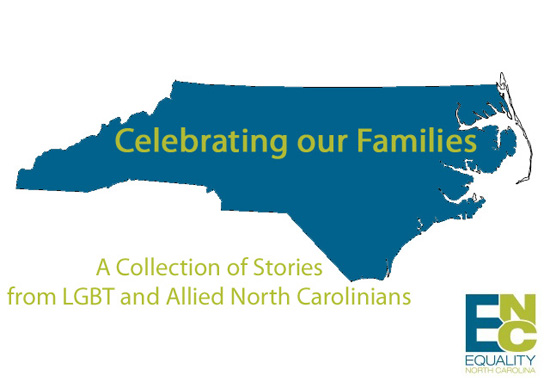
When Gary and I moved to Winston-Salem from Atlanta in 1993, we were, as far as we knew, the first and only gay couple to move into the neighborhood.
We noticed cars slowing down when they would pass our house, and people would stop and stare when walking through the area. We later learned from our next door neighbor that there was a lot of curiosity and concern about us. There is a tradition of a neighborhood Christmas party which we were encouraged to attend in order to meet our neighbors. It is a covered dish party, no alcohol, and lasts about two hours. When we attended, we sensed some discomfort, but much more curiosity. They had absolutely no idea of how we lived, if we would have a positive or negative effect on the neighborhood, or if they should even feel threatened.
We decided that the next function would be at our home. We drew up invitations, prepared all the food, and had an open bar. At the appointed time, about 50 people showed up - mostly because they couldn’t contain their curiosity. One of the first folks to come in looked around and loudly exclaimed “it looks just like a real home.”
About one in the morning, we started showing people to the door. After wandering around the house and enjoying our food and drinks, they grasped that we lived in a “real home”, but they couldn’t quite make the connection that we were also - a family. Their definition of that was a man, a woman, and children; not two men and a dog.
So, just what is it that makes a family? And, more importantly, to whom and why should it even matter?
Could it be other than a combination of one man and one woman, with or without children? Could it be two men or two women – with our without children? Could it be a man and woman in a non sexual relationship? Remember “Will & Grace”? What about single parents who never marry, grandparents and divorced people raising children, widows, widowers, and blended step families? We create all kinds and degrees of family. They range from blood relations to legal partners to those formed as a term of endearment. There are family- like groups based on religion, geography, and ethnicity. There are even committed, caring relationships providing a sense of belonging found in business, the military, and sports. Each created relationship meets the specific needs of its members.
“Family” is also a word with many resonations. The anti-gay industry uses it for many of their organizations. For example, Focus on the Family, The Family Research Council, and the American Family Association are but a few. There is even a strange right wing cult, populated by politicians, that calls itself “The Family.” Jeff Sharlet has written a book about them that will keep you awake at night.
Gary and I find that we must name and invent our family relationship in a world that does not culturally or legally support our existence nor understand an egalitarian companionship. We found that we had to decide how we would define ourselves to others such as our relatives, co-workers, doctors, lawyers, friends, and even our religious community. “Lover” sends a disconcerting sexual image to most straight people, “partner” invokes a business interest, “significant other” seems forced, and “friend” is totally insufficient. So, we use - “spouse.”
Bringing children into the equation raises more issues and inflames our adversaries. They say we will be responsible for inflicting pain on innocent beings? We are challenged to ask ourselves if we are expanding our family out of selfishness or self less ness?
When folks loudly disparage the authenticity of gay couples raising children on the basis that it is impossible and shout, “How can a same sex couple have children?” I smile and gently answer, “It’s a miracle!”
